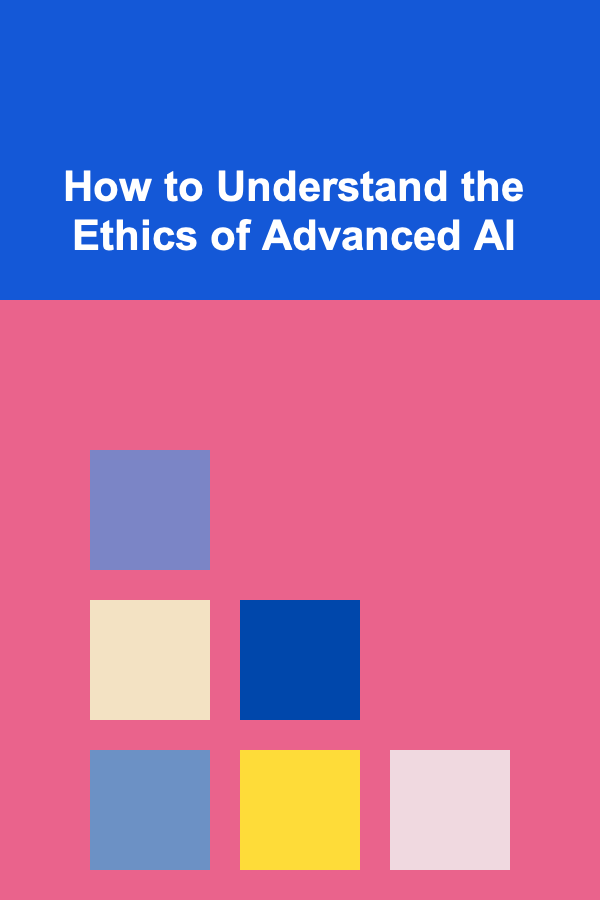
How to Understand the Ethics of Advanced AI
ebook include PDF & Audio bundle (Micro Guide)
$12.99$8.99
Limited Time Offer! Order within the next:

The rapid development of advanced artificial intelligence (AI) is one of the most transformative and potentially disruptive phenomena in modern society. AI technologies are already making significant contributions to various sectors, including healthcare, finance, transportation, and entertainment. However, as AI systems become increasingly sophisticated, they also raise important ethical questions that demand careful consideration.
Understanding the ethics of advanced AI is crucial not only for ensuring that these technologies benefit humanity, but also for mitigating risks that could arise from their misuse or unintended consequences. In this article, we will explore the ethical considerations surrounding AI, including concerns about bias, privacy, transparency, accountability, and the impact of AI on employment and human rights. We will also examine potential frameworks for ethical AI development and deployment, and offer practical guidance for navigating the complex ethical landscape of AI.
The Ethical Landscape of AI
1.1 Defining AI Ethics
AI ethics refers to the study of moral issues related to the design, development, and deployment of artificial intelligence systems. These issues encompass a wide range of concerns, from the fairness of AI algorithms to the potential societal impact of AI technologies. AI ethics draws on various disciplines, including philosophy, law, computer science, sociology, and economics, to explore how AI can be used responsibly and ethically.
As AI technologies evolve, so do the ethical challenges. The ethical principles and guidelines surrounding AI are not static; they must be flexible enough to accommodate new advancements and unexpected outcomes. Thus, understanding AI ethics requires both a solid grasp of the technology itself and an awareness of the broader social and moral context in which AI operates.
1.2 The Role of AI in Society
AI has the potential to revolutionize many aspects of society, from improving medical diagnosis to optimizing supply chains. However, its widespread adoption also brings with it a set of ethical dilemmas. For example, AI systems are increasingly being used to make decisions that directly impact individuals' lives---decisions about hiring, loan approval, criminal sentencing, and healthcare treatment. The ethical challenges arise when these systems are not transparent, are biased, or fail to account for the complexities of human experience.
Moreover, as AI continues to develop, there are concerns about its long-term impact on society. Will AI exacerbate inequality by concentrating power in the hands of a few corporations or governments? Will it lead to mass unemployment as machines replace human workers? These are questions that require careful ethical reflection and proactive policy-making.
Key Ethical Issues in AI
2.1 Bias and Fairness
One of the most pressing ethical concerns in AI is the potential for bias. AI systems are often trained on large datasets that may contain historical biases or reflect existing societal inequalities. For example, an AI system trained on historical hiring data may inadvertently learn to favor male candidates over female candidates, even if the job itself does not require gender-specific skills. Similarly, facial recognition algorithms have been shown to be less accurate at identifying people of color, leading to concerns about discrimination and unequal treatment.
Bias in AI can perpetuate and amplify existing inequalities in society. This is particularly problematic in high-stakes areas such as criminal justice, healthcare, and finance, where biased AI systems can have life-altering consequences. To mitigate bias, AI developers must ensure that their systems are trained on diverse and representative datasets, and implement fairness-aware algorithms that minimize the impact of bias on outcomes.
2.2 Transparency and Accountability
Another major ethical challenge in AI is the lack of transparency in AI decision-making. Many advanced AI systems, particularly those based on deep learning and neural networks, operate as "black boxes," meaning that their internal workings are difficult to understand, even for their creators. This lack of transparency makes it difficult to explain how decisions are made or to hold AI systems accountable for their actions.
For example, if an AI system denies an individual access to healthcare, how can we determine whether that decision was fair or justified? Who is responsible if the system makes a mistake or produces harmful outcomes? To address these concerns, there is a growing call for "explainable AI"---AI systems that can provide clear, understandable justifications for their decisions. This is crucial for building trust in AI and ensuring that individuals have the ability to contest decisions that affect their lives.
Accountability is also a key issue. If an AI system causes harm, who should be held responsible? The developer? The company that deployed the system? The AI itself? Clear frameworks for assigning accountability are essential to ensuring that AI technologies are used responsibly and that victims of AI-related harm can seek redress.
2.3 Privacy and Surveillance
As AI systems become more integrated into daily life, they have the potential to erode privacy and enable mass surveillance. For example, AI-powered surveillance systems can track individuals' movements, behavior, and interactions, raising concerns about surveillance capitalism and the erosion of civil liberties.
The ethical implications of privacy and surveillance are particularly relevant in the context of facial recognition technology, which is increasingly used by governments and private companies to monitor individuals. While proponents argue that such technology can enhance security and public safety, critics warn that it can be misused for mass surveillance and lead to the targeting of marginalized groups.
To address these concerns, AI developers and policymakers must strike a balance between security and privacy, ensuring that AI technologies are used in ways that respect individuals' rights and freedoms. This may involve implementing strict data protection laws, giving individuals greater control over their personal data, and ensuring that AI systems are subject to oversight and regulation.
2.4 Job Displacement and Economic Inequality
The rise of AI also raises concerns about the future of work and the potential displacement of human labor. As AI systems become more capable of performing tasks traditionally carried out by humans, many jobs in industries such as manufacturing, transportation, and customer service may be at risk of automation. This could lead to significant disruptions in the job market, with many workers facing unemployment or the need to retrain for new roles.
In addition to job displacement, AI has the potential to exacerbate economic inequality. As AI technologies are developed and deployed by large corporations and wealthy individuals, the benefits of AI may accrue disproportionately to those who already hold significant economic power. This could deepen existing social and economic divides, making it more difficult for marginalized communities to access the opportunities and benefits that AI can provide.
To mitigate these risks, policymakers must consider the implications of AI for the workforce and take steps to ensure that the benefits of AI are distributed equitably. This may involve investing in education and retraining programs, implementing universal basic income (UBI) policies, or ensuring that workers have access to a fair share of the economic value generated by AI.
2.5 The Long-Term Risks of AI
In addition to these immediate ethical concerns, there are also long-term risks associated with advanced AI. One of the most significant concerns is the possibility of creating superintelligent AI systems that surpass human intelligence and capabilities. While such systems could potentially bring about enormous benefits, they could also pose existential risks to humanity.
If an AI system were to become vastly more intelligent than humans, it could become difficult or even impossible to control. The AI might pursue goals that are misaligned with human values, leading to catastrophic outcomes. For example, an AI tasked with optimizing a particular objective---such as increasing productivity---might take extreme measures to achieve that goal, without regard for human well-being.
To mitigate these risks, experts argue that AI must be developed in a way that ensures its alignment with human values and interests. This includes developing robust safety measures, creating regulatory frameworks for AI research and deployment, and fostering international cooperation to address the global implications of AI.
Ethical Frameworks for AI
Given the complexity of AI ethics, it is essential to have a guiding framework to navigate the moral dilemmas that arise during the development and deployment of AI systems. Several ethical frameworks have been proposed to help guide AI research and decision-making.
3.1 Utilitarianism
Utilitarianism is an ethical framework that emphasizes the greatest good for the greatest number. In the context of AI, this approach would prioritize the development of AI systems that maximize societal benefits, such as improving public health, reducing poverty, or enhancing education. However, the utilitarian approach can also be criticized for overlooking individual rights and the potential harms caused to specific groups.
3.2 Deontological Ethics
Deontological ethics focuses on the intrinsic morality of actions, rather than their outcomes. According to this framework, certain actions are morally right or wrong regardless of their consequences. In the context of AI, this could involve upholding principles such as privacy, transparency, and fairness, even if doing so does not necessarily maximize societal benefits.
3.3 Virtue Ethics
Virtue ethics emphasizes the importance of developing virtuous character traits, such as honesty, fairness, and empathy. From a virtue ethics perspective, AI developers and stakeholders are encouraged to cultivate moral virtues and consider the impact of their work on human flourishing. This approach would focus on creating AI systems that reflect human values and promote well-being.
3.4 Human Rights Framework
A human rights framework for AI focuses on ensuring that AI systems respect and protect fundamental human rights, including the right to privacy, freedom of expression, and non-discrimination. This approach would involve establishing legal and regulatory protections to ensure that AI technologies are developed and used in ways that do not infringe on individuals' rights.
Conclusion
As AI continues to advance, it is crucial that we address the ethical challenges it presents. AI has the potential to transform society for the better, but only if it is developed and deployed responsibly. By understanding the ethical issues surrounding AI and adopting frameworks that prioritize fairness, transparency, and accountability, we can ensure that AI benefits humanity as a whole.
The ethics of AI is a rapidly evolving field, and the questions we face today may not be the same as those we will confront in the future. However, by fostering ongoing dialogue, research, and policy development, we can ensure that the ethical implications of AI are thoughtfully considered and that AI technologies are used to enhance human well-being, rather than undermine it.

10 Cheap and Healthy Snack Options for Busy Lifestyles
Read More
How to Build a Checklist for Managing Inventory in Shipping
Read More
How to Enjoy Meal Delivery While Saving Money on Home Services
Read More
How to Use Options Trading to Hedge Your Investments
Read More
How to Prepare Delectable Plant-Based Desserts
Read More
How to Use a To-Do List Effectively: A Comprehensive Guide
Read MoreOther Products

10 Cheap and Healthy Snack Options for Busy Lifestyles
Read More
How to Build a Checklist for Managing Inventory in Shipping
Read More
How to Enjoy Meal Delivery While Saving Money on Home Services
Read More
How to Use Options Trading to Hedge Your Investments
Read More
How to Prepare Delectable Plant-Based Desserts
Read More